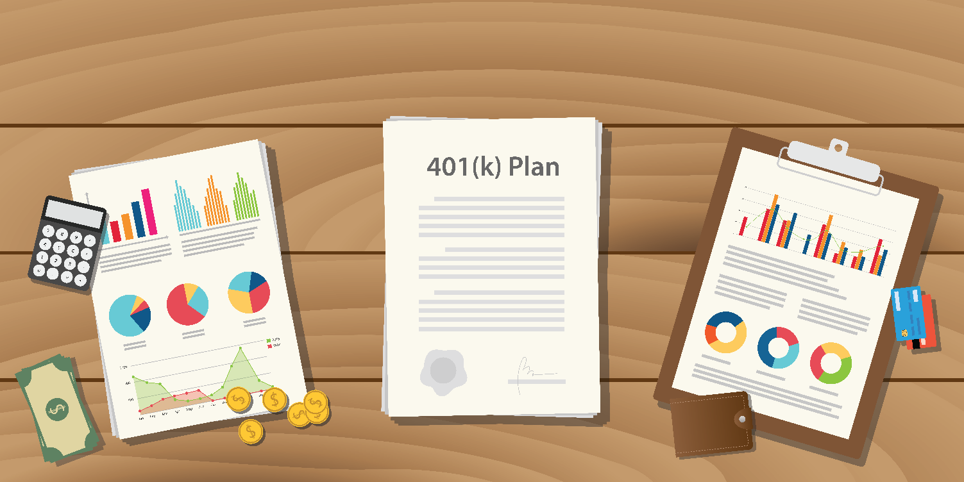 A 401(k) plan is a tax-advantaged retirement savings account that can only be accessed through a company that offers them to their employees. A 401(k) is a tax qualified, defined contribution plan defined in subsection 401(k) of the Internal Revenue Code (hence the name). You should definitely take advantage of a 401(k) if your company offers one with matching benefits.
A 401(k) plan is a tax-advantaged retirement savings account that can only be accessed through a company that offers them to their employees. A 401(k) is a tax qualified, defined contribution plan defined in subsection 401(k) of the Internal Revenue Code (hence the name). You should definitely take advantage of a 401(k) if your company offers one with matching benefits.
Let’s get some definitions and facts straight:
As mentioned above, a 401(k) is ‘tax qualified’ or ‘tax-advantaged’. What does ‘tax-qualified’ mean? It means that there is some tax benefit involved.
It is also a ‘defined contribution plan’ meaning the ultimate account value depends on the total amount contributed, along with interest and capital gains from the plan’s investments.
The contributions to your 401(k) plan come from your paycheck and can come from your company if they have a contribution/ matching program. 403(b) and 457(b) are like a 401(K). You may have a 403(b) if you work for a non-profit or a 457(b) if you are a government employee.
Tax-Qualified: So what’s the tax benefit?
Your contributions to the plan are paid with pre-tax dollars, meaning they are taken ‘off the top’ of your gross salary, reducing your taxable earned income. Those pre-tax dollars get to grow tax deferred. Because of that deferral, taxes become due on the 401(k) funds once the distributions begin.
Bottom line: not only are you able to reduce your taxable income for the year, but your pre-tax dollars grow and experience compound interest tax-deferred!
When it comes time to take distributions from your 401(k) you pay taxes at that time. Speaking of distributions, you can withdrawal from your 401(k) without penalties when you turn 59 ½ . The April following the year you turn 70 ½ you are required to take a minimum distribution based on a formula.
What happens if I want to take money out before I am 59 ½ ? You can but there are several things to consider.
- First you will be subject to a 10% tax penalty.
- You will have to pay your normal income tax on the withdrawal on top of the 10% penalty.
- You may not be fully ‘vested’ with your plan. Vesting is a term used to refer to degree of ownership that a employee has in a 401(k). Think of it as what you are entitled to. The vested schedules are determined by the company. For example, you may have to work with the company for 5 years before you are 100% vested. Often times employers use vesting schedules to encourage employee retention.
All of these factors can significantly reduce your hard earned savings, so it is best to not withdrawal from your 401(k) prior to being 59 ½.
There are exceptions to the 10% penalty that include situations like disability or medical expenses greater than 7.5% of your adjusted gross income. For a full list of the current exceptions this is a helpful link: irs.gov Keep in mind, the point of a 401(k) is retirement savings.
Roth 401(k) vs. Regular 401(k)
A Roth 401(k) is fairly new and was introduced in 2006. A Roth 401(k) is being offered more and more, with over half of all companies offering this type of 401(k). Whenever you see Roth think after tax dollars. 401(k) contributions are made with PRE-tax dollars. Roth 401(k) contributions are made with POST tax dollars. That means you pay the taxes on your contribution now, instead of when you withdrawal those funds.
The Roth 401(k) benefit is that you may be in a lower tax bracket throughout your contribution time than at the time of distribution when you pay the tax on a traditional 401(k).
You will still have to pay taxes on the ‘employer match’ part of your Roth 401(k) but you will not pay on the earnings/growth or contributions. Something to consider in regards to utilizing either a Roth 401(k) vs. the traditional 401(k) is the unknown of future tax brackets and tax percentages.
Rolling out your 401(k)
There are several instances that will call for a ‘roll-out’ of your 401(k). ‘Roll out’ or ‘rolling over’ just means to transfer and in this instance, you are ‘rolling out’ your 401(k) plan into a different type of account structure. In this blog we will cover rollouts due to changing companies or retiring.
If you change employers and had a 401(k) with your previous employer, you can rollout that 401(k) into an Individual Retirement Account (IRA) Rollover with no tax penalties or change to tax structure. One of the best explanations of this process is to visualize a jar of money and a tiny sweater. The jar represents the money you have saved, and the sweater represents the tax structure or ‘account type’. Think of the sweater as tax protection! Once you are no longer an employee you can take your 401(k) distribution and transfer it directly into an IRA rollover to make sure you are not penalized or taxed. You basically take the jar, remove the 401(k) sweater, and put on the IRA rollover sweater quickly!
The IRS gives you 60 days or else it considers it a distribution and if you are under 59 ½ all the penalties and taxes will be due.
Once your 401(k) becomes an IRA rollover you have full control in how you manage those assets. The same process is involved when you retire. If you have any questions in regards to how to invest your IRA rollover, or to assist you in an IRA rollover you are more than welcome to give our office a call!
Final Thoughts
A 401(k) is a tax-qualified retirement savings plan offered through an employer and it should be part of your overall financial plan if your company offers one and matches employee contributions. Here are some final thoughts to keep in mind:
- This is only a piece of your overall savings and financial plan, it shouldn’t be your only one!
- Everything from your budget to your investment plan is highly personalized to your needs. What works for one person may not work for you yet.
- Keep your 401(k) for retirement- do not withdrawal early!
- If your company matches then you should definitely have a 401(k) plan. Contribute as much as you can up to your company match. Then utilize other retirement savings outside of the 401(k) if you would like to save more.
- And finally, Spectrum is always here to help you answer any questions when it comes to your investments.
Spectrum does not hold itself out as experts in
401(k) and/or retirement matters. This
article is meant as an educational piece, so investors understand general
concepts. For specific details relating
to your situation, please contact a CPA, attorney, or 401(k) specialist.
 You would be surprised how many working adults haven’t prepared for their own retirement.
You would be surprised how many working adults haven’t prepared for their own retirement.
